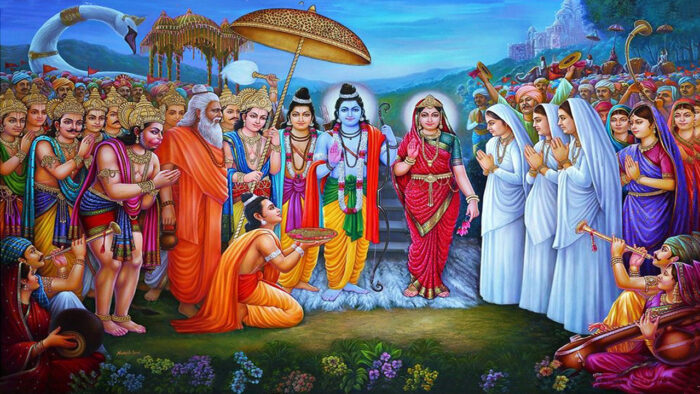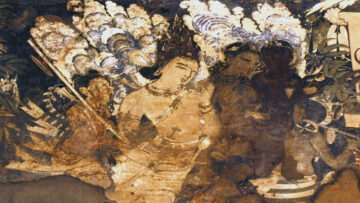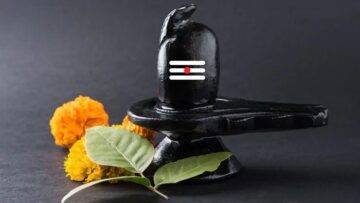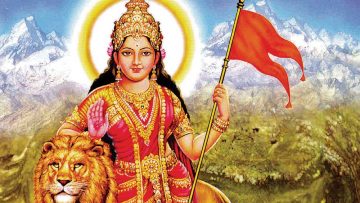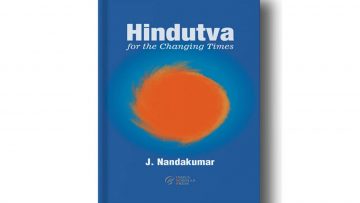Rama … the name itself calms the mind and tames the senses. Rama, the greatest of Kings who ruled to perfection, such that Rama-Rajya is the ultimate rule in all of the history of mankind. Rama, the most loving of sons who did not disrespect even in thought, the Mother who sent him to the forest for 14 years. Rama, the best of brothers who makes one wonder if anything like “sibling rivalry” exists. Rama, the best of archers who was most powerful and had knowledge of all Divya-astras but still waited for permission from Varuna, the Sea God, to give way to his army across the sea. Rama, the ultimate friend who advices Sugreeva against falling for vices and treats the boatman Guha, with love and utmost respect. Rama, the mightiest of protectors who protects dharmaniṣṭha Vibheeshan against Ravana. Rama, the Master who transforms a Kapi to a Dāsa, capable of bringing out the best to fight Adharma. Rama, who embodies the word Nātha by being the best life-partner to Sita.
So many roles and so many achievements … which one is better than the others? In fact, is there even one role that is better than the other? The most perplexing thing about Sri Rama’s life is that though it is a string of achievements, to the first time reader of the Ramayana, it feels like his life is that of many disappointments and sorrows. And yet, he evokes the image of being the strongest of persons. It almost seems like a mystery until we look at the Ramayana with Bhakti. And then the miracle happens. We notice a new facet of his personality which we understand only when we look at him as Prabhu Sri Rama and then he transforms as the Avatāra Puruṣa, the Maryādā Puruṣottama. He becomes that Entity, the Brahman who everyone surrenders to, on their own.
What is this surrender? It is that action or rather inaction which every character in the Ramayana shows, which makes Sri Rama appear larger than life. When one looks at Hanuman, it becomes obvious that he is capable single-handedly of causing deep harm to the entire army of Ravana. He could have brought back Sita without Ravana even knowing about it. But he doesn’t do so. In fact, the day before the battle he slaps Ravana but doesn’t kill him. Throughout the Ramayana it feels as if without Hanuman, Rama wouldn’t have emerged as the hero, but there is not a single scene where one feels that Hanuman tries to be one-up on Rama. Can you imagine such a powerful person consciously allowing someone else to take the credit for having defeated the enemy? Why did Hanuman do it? The answer could be found in the shloka that Hanuman says to introduce himself to the Rākṣasas at Aśokavana –
दासोऽहंकोसलेन्द्रस्यरामस्याक्लिष्टकर्मणः।
हनुमान्शत्रुसैन्यानांनिहन्तामारुतात्मजः।।5.43.9।।
(dāso’haṃkosalendrasyarāmasyākliṣṭakarmaṇaḥ
hanumānśatrusainyānāṃnihantāmārutātmajaḥ)
(‘I am the son of the Windgod, destroyer of enemy army. I am a servant of Rama, the king of Kosala who can accomplish any task with ease.)
Or when he himself tells Sri Rama about their relationship –
देहबुद्ध्यातुदासोऽस्मिजीवबुद्ध्यात्वदंशकः।
आत्मबुद्ध्यात्वमेवाहमितिमेनिश्चितामतिः॥
(dehabuddhyātudāso’smijīvabuddhyātvadaṃśakaḥ।
ātmabuddhyātvamevāhamitimeniścitāmatiḥ॥)
“When I identify myself with my body, I am your servant. When I consider myself as Individual Soul, I am a part of you. But when I look upon myself as the Ātmā, I am one with you”
(This shloka is not part of the Valmiki Ramayana; it appears in a Ramayana of a later date and also in the Guha Gita (6.2))
If these verses do not refer to the ultimate surrender to the Supreme One, what does? It is only Prabhu Sri Rama who can invoke the feeling of such humility and total surrender to Brahman.
If we were to look at Sita’s character in the Ramayana too, we see the same inherent strength and the devoted surrender to her husband to defeat the Adharmī Ravana and rescue her. She keeps Ravana at arm’s length by telling him that if he were to cross the straw she had put in front of her, he would be burned to ashes and the mighty Ravana is too scared to experiment. He feels her power and strength and doesn’t lay a finger on her. Sita blesses Hanuman with protection from Agni when he sets Lanka afire; she blesses him to be the giver of Aṣṭa-Siddhi and Nava-Nidhi but still doesn’t use her powers to kill Ravana. Why? It is simply because she has surrendered herself to her husband who is the Divine Narayan himself, and lays the duty of rescuing her on his broad shoulders.
The reader could easily wonder if that is what one needs to do all the time – just surrender to the Divine and say it is all His play (Līlā). Absolutely not! What Ramayana teaches us and more importantly what Rama helps us understand is that while it is important that Puruṣa does His duty of delivering justice and balance in the cosmos, one needs to use one’s strength and efforts to make sure the Puruṣa does His work. If Hanuman would have rescued Sita, would Ravana have been killed and Adharma destroyed? But if Hanuman would have not reached Sita, could this deed have been done either? No! Similarly, if Sita would have given in to Ravana’s lecherous ways, would Rama have the moral courage and strength to kill Ravana and rescue her? Definitely not. Sita is Rama’s Shakti. She did her duty and left the rest to Sri Rama.
Sri Rama is that embodiment of compassion who knows that while we need to put in our efforts and build up our strength for every obstacle/outcome that comes our way, we also need to develop a detachment to the results. That detachment comes only from surrendering our efforts to the Divine and leaving Him to give us our due desserts. When we have Bhakti towards Sri Rama, we see that this attachment to Him and detachment from other expectations comes easily to us. Through the ages, we have seen this in action in all his devotees, whether it is Tulsidas or Thyagaraja or any of us who are nowhere close to these great devotees. The moment one says “Rama”, one feels the burden of achieving results being taken away from one and yet, miraculously because the burden is now being shouldered by Ajānabāhu, we see our actions culminating in positive results. This is the true greatness of Sri Rama. He takes away our pains, our tiredness, our hopelessness, the heavy weight of our own expectations and fills us with hopes, positivity and drops in our laps the fruits of our action. May we all experience the bliss of such a surrender!
Jai Sri Ram!
Feature Image Credit: pinterest.com
Disclaimer: The opinions expressed in this article belong to the author. Indic Today is neither responsible nor liable for the accuracy, completeness, suitability, or validity of any information in the article.

